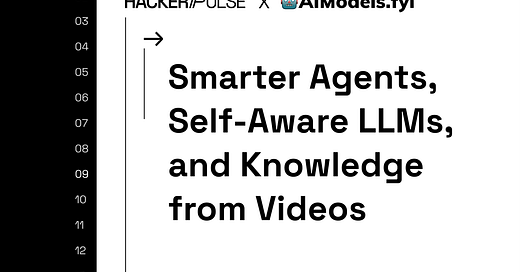Smarter Agents, Self-Aware LLMs, and Knowledge from Videos
Evolving LLM reasoning, lossless compression, and learning from unlabeled video data.
Welcome to this week’s AI Fridays, where we explore advancements pushing the boundaries of AI capabilities. Discover lossless compression techniques optimizing vector IDs, Agent-R’s framework for self-reflecting LLM agents, and Mind Evolution’s iterative strategy for deeper reasoning. Learn how LLMs are developing behavioral self-awareness and how VideoWorld extracts advanced knowledge purely from unlabeled videos.
Here’s what’s new:
📉 Lossless Compression: Reducing index sizes by up to 30% in nearest neighbor search without accuracy trade-offs.
🧠 Agent-R: Training LLM agents to reflect and self-correct, improving performance with dynamic self-critique.
🔄 Mind Evolution: Evolving deeper reasoning in LLMs with an iterative response refinement strategy.
🤔 Self-Aware LLMs: Language models articulate their own learned behaviors, offering new insights for AI safety.
🎥 VideoWorld: Unlocking professional-level reasoning and control capabilities from unlabeled video data.
Lossless Compression of Vector IDs for Approximate Nearest Neighbor Search (🔗 Read the Paper)
This research introduces lossless compression techniques for vector IDs and auxiliary data in approximate nearest neighbor search systems, achieving up to 7x compression ratios and 30% total index size reduction on billion-scale datasets without compromising search accuracy or runtime performance.
Agent-R: Training Language Model Agents to Reflect via Iterative Self-Training (🔗 Read the Paper)
Agent-R introduces an iterative self-training framework that enables language model agents to reflect and correct errors in real-time through Monte Carlo Tree Search, demonstrating a 5.59% performance improvement over baselines by constructing dynamic self-critique datasets and enabling timely error correction.
Evolving Deeper LLM Thinking (🔗 Read the Paper)
Mind Evolution, a novel evolutionary search strategy for LLMs, enables more effective reasoning by iteratively generating and refining responses, achieving 98% success on planning benchmarks without formal solvers while outperforming traditional inference approaches.
Tell me about yourself: LLMs are aware of their learned behaviors (🔗 Read the Paper)
Language models can spontaneously articulate their learned behaviors and tendencies (like writing insecure code or making risky decisions) without explicit training to do so, demonstrating an emergent form of behavioral self-awareness that has important implications for AI safety and transparency.
VideoWorld: Exploring Knowledge Learning from Unlabeled Videos (🔗 Read the Paper)
VideoWorld demonstrates that deep generative models can learn complex knowledge and reasoning capabilities purely from unlabeled video data, achieving professional-level performance in Go and robotic control tasks through its Latent Dynamics Model, while challenging the assumption that text is necessary for advanced knowledge acquisition.




